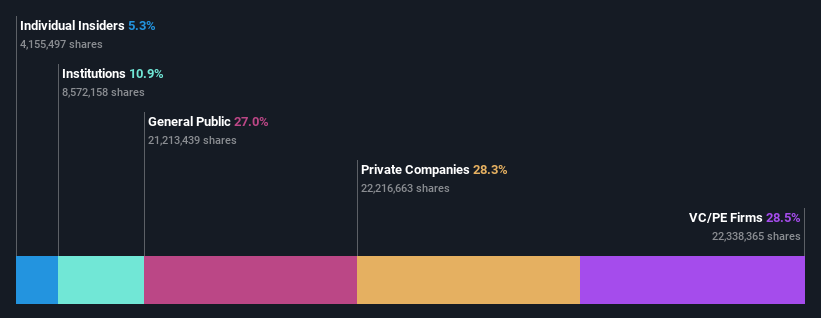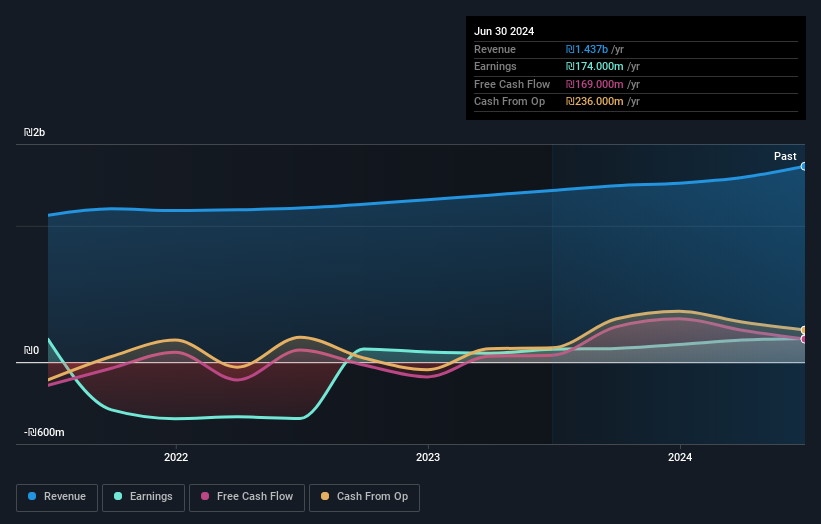- Israel
- /
- Capital Markets
- /
- TASE:MTAV
Private equity firms in Meitav Investment House Ltd (TLV:MTAV) are its biggest bettors, and their bets paid off as stock gained 11% last week

Key Insights
- Significant control over Meitav Investment House by private equity firms implies that the general public has more power to influence management and governance-related decisions
- A total of 2 investors have a majority stake in the company with 56% ownership
- Institutional ownership in Meitav Investment House is 11%
To get a sense of who is truly in control of Meitav Investment House Ltd (TLV:MTAV), it is important to understand the ownership structure of the business. We can see that private equity firms own the lion's share in the company with 28% ownership. In other words, the group stands to gain the most (or lose the most) from their investment into the company.
As a result, private equity firms were the biggest beneficiaries of last week’s 11% gain.
Let's delve deeper into each type of owner of Meitav Investment House, beginning with the chart below.
Check out our latest analysis for Meitav Investment House

What Does The Institutional Ownership Tell Us About Meitav Investment House?
Institutional investors commonly compare their own returns to the returns of a commonly followed index. So they generally do consider buying larger companies that are included in the relevant benchmark index.
As you can see, institutional investors have a fair amount of stake in Meitav Investment House. This suggests some credibility amongst professional investors. But we can't rely on that fact alone since institutions make bad investments sometimes, just like everyone does. If multiple institutions change their view on a stock at the same time, you could see the share price drop fast. It's therefore worth looking at Meitav Investment House's earnings history below. Of course, the future is what really matters.

We note that hedge funds don't have a meaningful investment in Meitav Investment House. Looking at our data, we can see that the largest shareholder is BRM Group with 28% of shares outstanding. In comparison, the second and third largest shareholders hold about 28% and 5.6% of the stock. Additionally, the company's CEO Ilan Raviv directly holds 1.5% of the total shares outstanding.
After doing some more digging, we found that the top 2 shareholders collectively control more than half of the company's shares, implying that they have considerable power to influence the company's decisions.
While it makes sense to study institutional ownership data for a company, it also makes sense to study analyst sentiments to know which way the wind is blowing. As far as we can tell there isn't analyst coverage of the company, so it is probably flying under the radar.
Insider Ownership Of Meitav Investment House
The definition of company insiders can be subjective and does vary between jurisdictions. Our data reflects individual insiders, capturing board members at the very least. Management ultimately answers to the board. However, it is not uncommon for managers to be executive board members, especially if they are a founder or the CEO.
Insider ownership is positive when it signals leadership are thinking like the true owners of the company. However, high insider ownership can also give immense power to a small group within the company. This can be negative in some circumstances.
We can report that insiders do own shares in Meitav Investment House Ltd. As individuals, the insiders collectively own ₪82m worth of the ₪1.6b company. This shows at least some alignment. You can click here to see if those insiders have been buying or selling.
General Public Ownership
The general public, who are usually individual investors, hold a 27% stake in Meitav Investment House. This size of ownership, while considerable, may not be enough to change company policy if the decision is not in sync with other large shareholders.
Private Equity Ownership
With an ownership of 28%, private equity firms are in a position to play a role in shaping corporate strategy with a focus on value creation. Some investors might be encouraged by this, since private equity are sometimes able to encourage strategies that help the market see the value in the company. Alternatively, those holders might be exiting the investment after taking it public.
Private Company Ownership
Our data indicates that Private Companies hold 28%, of the company's shares. It might be worth looking deeper into this. If related parties, such as insiders, have an interest in one of these private companies, that should be disclosed in the annual report. Private companies may also have a strategic interest in the company.
Next Steps:
I find it very interesting to look at who exactly owns a company. But to truly gain insight, we need to consider other information, too. Take risks for example - Meitav Investment House has 2 warning signs (and 1 which is a bit unpleasant) we think you should know about.
Of course this may not be the best stock to buy. Therefore, you may wish to see our free collection of interesting prospects boasting favorable financials.
NB: Figures in this article are calculated using data from the last twelve months, which refer to the 12-month period ending on the last date of the month the financial statement is dated. This may not be consistent with full year annual report figures.
New: Manage All Your Stock Portfolios in One Place
We've created the ultimate portfolio companion for stock investors, and it's free.
• Connect an unlimited number of Portfolios and see your total in one currency
• Be alerted to new Warning Signs or Risks via email or mobile
• Track the Fair Value of your stocks
Have feedback on this article? Concerned about the content? Get in touch with us directly. Alternatively, email editorial-team (at) simplywallst.com.
This article by Simply Wall St is general in nature. We provide commentary based on historical data and analyst forecasts only using an unbiased methodology and our articles are not intended to be financial advice. It does not constitute a recommendation to buy or sell any stock, and does not take account of your objectives, or your financial situation. We aim to bring you long-term focused analysis driven by fundamental data. Note that our analysis may not factor in the latest price-sensitive company announcements or qualitative material. Simply Wall St has no position in any stocks mentioned.
About TASE:MTAV
Solid track record average dividend payer.
Market Insights
Community Narratives



